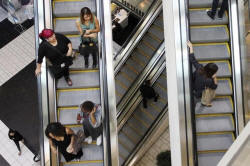|
U.S. retail sales post
smallest gain in six months
 Send a link to a friend
Send a link to a friend
 [March 15, 2017]
WASHINGTON,
(Reuters) - U.S. retail sales recorded their smallest increase in six
months in February as households cut back on motor vehicle purchases and
discretionary spending, the latest indication that the economy lost
further momentum in the first quarter. [March 15, 2017]
WASHINGTON,
(Reuters) - U.S. retail sales recorded their smallest increase in six
months in February as households cut back on motor vehicle purchases and
discretionary spending, the latest indication that the economy lost
further momentum in the first quarter.
The Commerce Department said on Wednesday retail sales edged up 0.1
percent last month, the weakest reading since August. January's retail
sales were revised up to show a 0.6 percent rise instead of the
previously reported 0.4 percent advance.
Sales were also likely held back by delays in issuing tax refunds this
year as part of efforts by the government to combat fraud. Compared to
February last year retail sales were up 5.7 percent.
Excluding automobiles, gasoline, building materials and food services,
retail sales gained 0.1 percent after an upwardly revised 0.8 percent
jump in January. These so-called core retail sales, which correspond
most closely with the consumer spending,component of gross domestic
product, were previously reported to have increased 0.4 percent in
January.
Economists polled by Reuters had forecast retail sales edging up 0.1
percent and core sales gaining 0.2 percent last month. Signs of cooling
domestic demand will probably not prevent the Federal Reserve from
raising interest rates later on Wednesday against the backdrop of
firming inflation and a tightening labor market.


The U.S. central bank is expected to raise its overnight benchmark
interest rate by 25 basis points to a range of 0.75 percent to 1.00
percent on Wednesday. It increased borrowing costs last December and has
forecast three rate hikes in 2017.
February's retail sales added to January's weak reports on trade,
construction and business spending that have pointed to sluggish
economic growth in the first quarter.
[to top of second column] |

Shoppers ride escalators at the Beverly Center mall in Los Angeles,
California November 8, 2013. REUTERS/David McNew

The Atlanta Fed is forecasting GDP rising at a 1.2 percent annualized
rate in the first quarter. With the labor market near full employment,
slowing growth probably understates the health of the economy. In
addition, GDP growth tends to be weaker in the first quarter because of
calculation issues that the government has acknowledged and is working
to resolve.
Tightening labor market conditions, which are steadily lifting wages,
continue to underpin consumer spending.
In February, motor vehicle sales fell 0.2 percent after declining 1.3
percent the prior month. Receipts at service stations slipped 0.6
percent, reflecting lower gasoline prices.
Sales at electronics and appliances stores fell 2.8 percent, the biggest
decline since December 2011, after climbing 1.1 percent in January.
Receipts at building material stores increased 1.8 percent.
Sales at clothing stores fell 0.5 percent. Retailers including J.C.
Penney Co Inc, Abercrombie & Fitch <ANF.N> and Macy's Inc <M.N> are
scaling back on brick-and-mortar operations amid increased competition
from online retailers, led by Amazon.com.
Sales at online retailers jumped 1.2 percent last month after increasing
0.5 percent in January. Receipts at restaurants and bars dipped 0.1
percent, while sales at sporting goods and hobby stores fell 0.4
percent.
(Reporting by Lucia Mutikani; Editing by Andrea Ricci)
[© 2017 Thomson Reuters. All rights
reserved.] Copyright 2017 Reuters. All rights reserved. This material may not be published,
broadcast, rewritten or redistributed. |